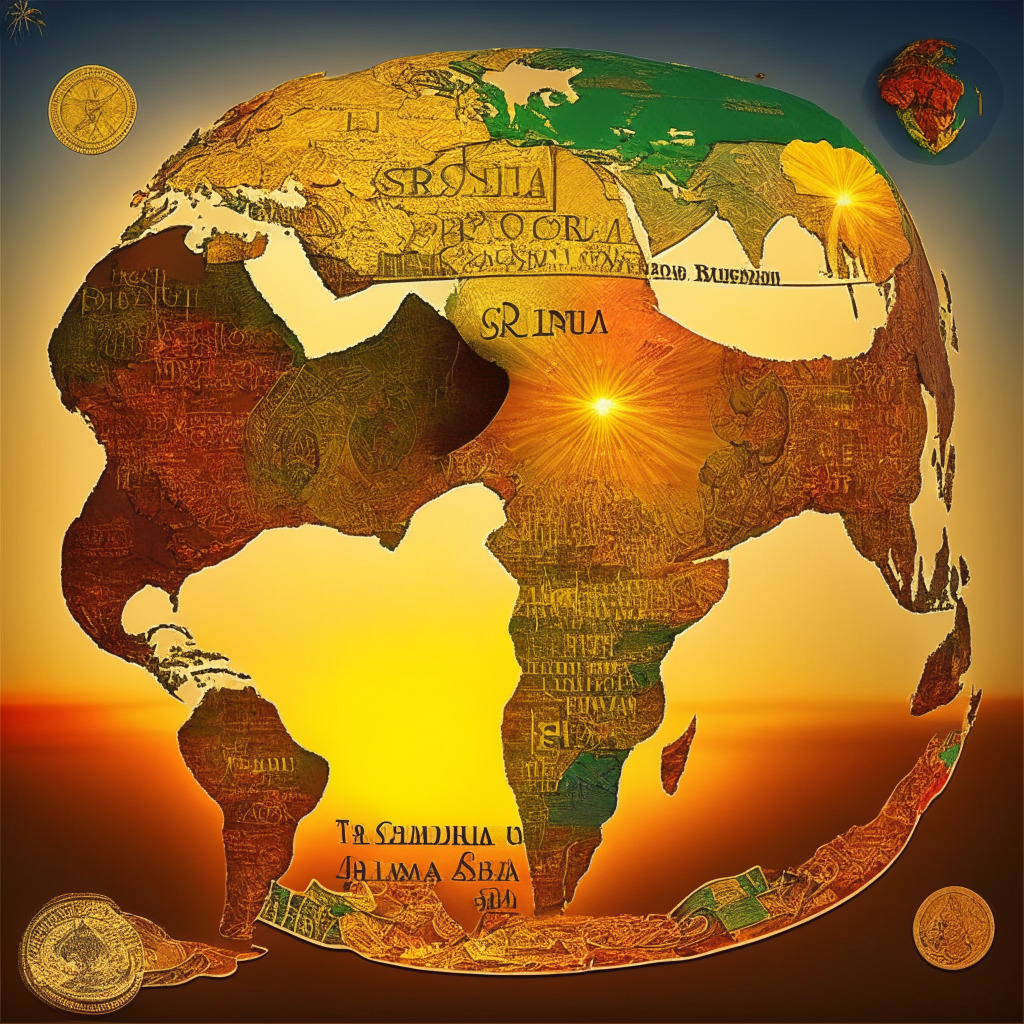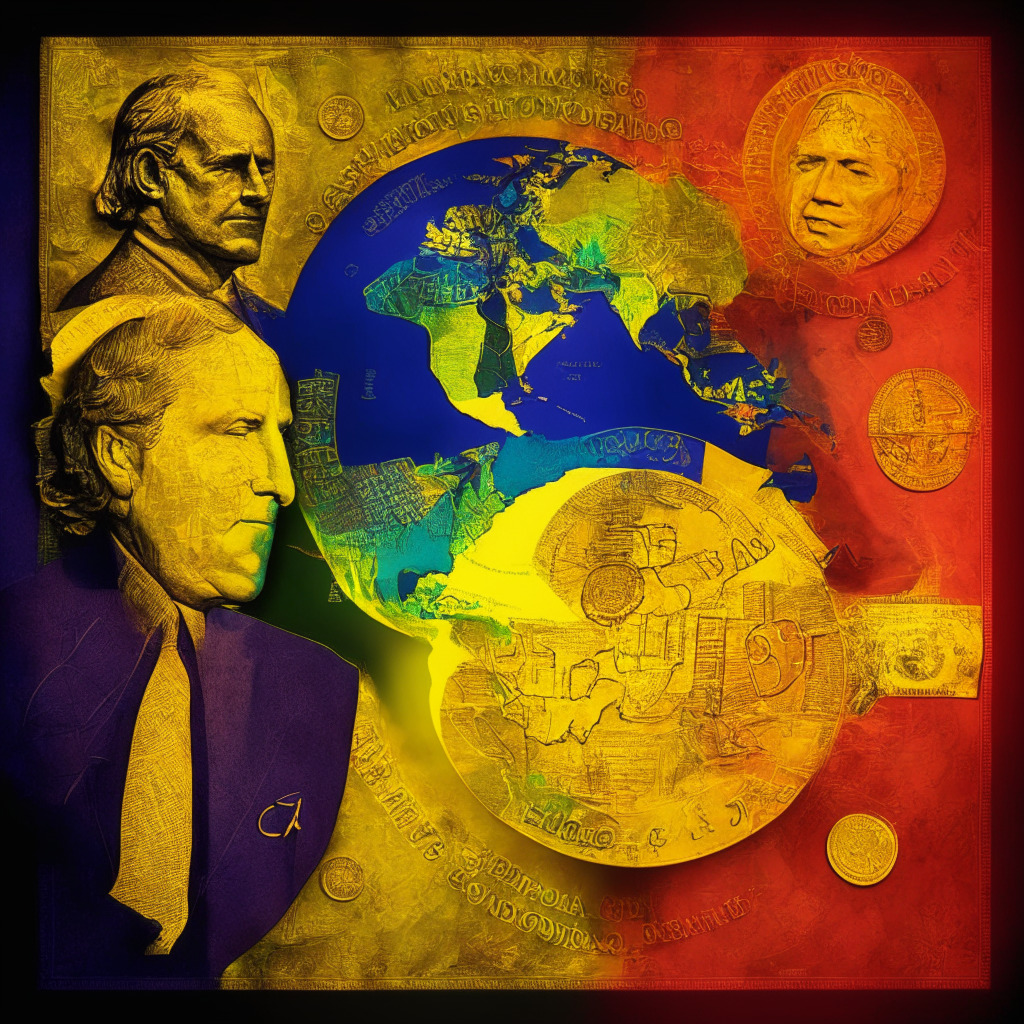“Macroeconomist Lyn Alden argues against the feasibility of a forthcoming gold-backed BRICS currency, citing it a tough challenge for BRICS members. Doubts are raised about the model backing a fractional-reserve banking system with gold.”
Search Results for: Brics
BRICS Digital Currency Debate: The Future of Global Trade or Merely a Fantasy?
Experts from Brazil anticipate BRICS summit discussions on a potential digital fiat currency, with workgroups likely being established for the initiative. A collective digital currency could potentially replace the US dollar in trade deals among BRICS nations despite sceptical voices. Individual nations within the BRICS alliance, including China, Russia, and Brazil, have already initiated their own Central Bank Digital Currency (CBDC) projects.
BRICS Gold-Backed Digital Currency: Boon or Global Economic Game Changer?
The upcoming BRICS Summit in 2023 may unveil a gold-backed digital currency to enhance financial independence for Brazil, Russia, India, China, and South Africa, reducing reliance on existing monetary systems like the US Dollar. This unified digital currency could increase investment, growth, trade, and cooperation within BRICS, benefiting the global economy and potentially reducing the dominance of the US Dollar and euro.
Cryptocurrencies and Arab World: Saudi Arabia’s BRICS Bank Bid, Opportunities, and Challenges
Cryptocurrencies gain traction in the Arab world, with Saudi Arabia potentially joining the New Development Bank (NDB), opening new funding channels and fostering cryptocurrency adoption. However, geopolitical uncertainties and strategic regulations must be navigated to ensure sustainable success.
BRICS Nations Contemplating Alternative Trade Currency: Challenging the US Dollar’s Dominance
BRICS nations contemplate alternatives to reduce reliance on the faltering US dollar, with Brazil’s President Lula supporting a new currency for trade between BRICS countries. This challenges the US dollar’s dominance and could reshape the global financial order.
Iran’s Move to Join BRICS: Opportunities, Challenges, and Global Power Shift Dynamics
Iran’s move to join BRICS and create a multipolar world presents opportunities and challenges for global financial markets, digital currencies, and blockchain adoption. This shift signifies changing global power dynamics and pushes towards a more balanced and inclusive world order.
Debate Booms as BRICS Bloc Explores Single Currency: U.S. Dollar’s Dominance at Stake?
The BRICS bloc, comprising of Brazil, Russia, India, China, and South Africa, is exploring the […]
Ditching Dollar Dilemma: BRICS Nations Debate Pros and Cons in International Settlements
BRICS nations are currently debating the merits and drawbacks of abandoning the U.S. dollar in […]
Bye Bye Dollar? BRICS Nations Aim to Secure Currency Deal by 2023 amid De-dollarization Efforts
The chairman of the State Duma Committee on the Financial Market, Anatoly Aksakov, has announced […]
Unveiling the Future of Bitcoin: OpenAI’s Endorsement, Putin’s Dollar Shift Concerns and Price Trends
The CEO of OpenAI, Sam Altman, praises Bitcoin for its potential to combat corruption due to its independence from government control. He and Joe Rogan express concern over US handling of cryptocurrency regulation and central bank digital currencies. Despite recent price dips, Altman and Rogan remain hopeful for Bitcoin’s future due to its limited supply and decentralized mining. However, they caution that like all investments, cryptocurrencies are volatile and risky and require careful research and strategy.
Russian Legislator Predicts Global Foray of Digital Ruble by 2025, Possible Shift in International Trade
A high-ranking Russian legislitor, Anatoly Aksakov, predicts that domestic corporations will utilize the nation’s digital ruble, a Central Bank Digital Currency (CBDC), by 2025, especially in Latin American nations. He also suggested potential usage could transform “mutual settlements” among these nations.
Exploring Russia’s Pivot to Crypto: Boosting Trade Ties or Cannibalizing Traditional Banking?
Russian entrepreneurs aim to use “digital assets” and a “unified digital currency” for trade with BRICS and other nations. The idea of utilizing digital financial assets (DFAs), which may encompass digitized commodities, CBDCs, digital securities, cryptoassets, and stablecoins, in international payments is garnering attention. The possibility of creating a unified digital currency for cross-border transactions is also being evaluated.
Deciphering China’s Crypto Future: A Step Beyond USD Dependence?
Chinese scholar, Huang Qicai, suggests digital currencies could stimulate a global transition from USD dependence, potentially leading to a “world currency multi-polarization”. Key nations like China, Russia and Brazil are making significant strides in digital currencies, hinting at a potential change in global monetary governance.
Navigating Market Drops and Community Building: Reassessing Crypto’s Future Prospects
“Amid Bitcoin’s drop to $26,000, there is no evidence of professional traders turning bearish, suggesting a less prolonged correction period. Meanwhile, post-crash Bitcoin futures show a healthy demand equilibrium. The article also introduces Iman Europe’s Web3-based project that envisions a supportive space for artists in the music industry, underlining crypto’s potential beyond mere profit-making.”
Banking on the Digital Ruble: Heralding a New Era or Stoking Controversy?
The Russian Central Bank’s proposal classifies the digital ruble, as a “high-quality liquid asset”. This could usher a dramatic reconfiguration of how financial institutions perceive and maintain liquid assets, potentially revolutionizing cross-border payment methods. However, this shift is viewed with apprehension among commercial banks.
The Dollar’s Tenacity: How Its Resilience Could Influence Bitcoin’s Pricing Trajectory
“Recent currency instability in China, Russia, and Argentina has cast doubt on de-dollarization, potentially affecting Bitcoin’s pricing trajectory. The stability of the USD forces struggling nations to rethink their financial strategies. This, coupled with unpredictability of cryptocurrencies like Bitcoin, underscores the need for careful investment and staying updated with currency trends.”
Stablecoins: A Counterbalance Against De-dollarization and Boost for US Global Standing
“U.S. regulated fiat-backed stablecoins could counterbalance the weakening dominance of the dollar due to de-dollarization efforts by BRICS and emerging markets. Pegged to the U.S. dollar, these digital tokens merge traditional currency stability with cryptocurrencies’ technological strength.”
Regulating the Digital Ruble: Russia’s Bold Leap into Digitized Sovereign Assets
“The Russian Federal Bailiff Service can now seize digital rubles from citizens and collect fines in digital currency. This forecasts a future where citizens can pay debts directly from their digital wallets linked to Central Bank Digital Currencies (CBDCs), possibly even having their wallets frozen if convicted of crimes or debt negligence. Further, this may lead to cross-national digital currency ecosystems, offering transformative potential yet posing regulatory challenges and questions about personal financial freedom.”
Rushing towards Russia’s Digital Ruble: A Leap of Progress or a Hasty Endeavour?
Russia’s Central Bank plans to introduce its digital ruble by 2025, amid keen interest from the country’s financial institutions. This comes as U.S. and EU-led sanctions hinder Moscow’s dollar trade, incentivizing their shift to a digital currency. Despite international skepticism, Russia is exploring cross-border CBDCs and partnerships with “friendly countries.” Amid this eager transition, experts emphasize the importance of maintaining safety and traditional systems.
Navigating Russia’s Path to Digital Ruble: CBDC Trials Amid Crypto Contention
The Russian Central Bank is set to start real-world tests of the digital ruble this month, marking a significant step in Central Bank Digital Currencies (CBDCs). This move comes as a response to international sanctions, fueling a demand for alternative trade options in Russia, including cryptocurrencies and the digital ruble.
Regulation Revolution: How MiCA and Euro Stablecoins Could Reshape the Crypto Landscape
The Markets in Crypto Assets (MiCA) regulation aims to introduce regulatory transparency to global crypto markets, including the creation of a European stablecoin. Amidst concerns over the U.S. economy and dollar-dominated transactions, the crypto market sees Euro-backed stablecoins as a critical alternative. This could potentially challenge the U.S. dollar’s dominance in digital asset markets.
Demise of the Dollar: Kiyosaki’s Forecast and the Golden Opportunity for Crypto
Esteemed financial author Robert Kiyosaki forecasts the “demise” of the U.S. dollar following the alliance of BRICS nations to establish a gold-backed currency, predicting a significant Bitcoin surge to $120,000 per coin. Economic shifts and increasing crypto interest indicate a potential upheaval of the dollar’s long-held position as world reserve currency.
De-Dollarization Wave: Pakistan’s Yuan-Based Oil Import and Global Implications
Pakistan’s recent oil import from Russia, using China’s Yuan, showcases the growing momentum towards de-dollarization and the exploration of alternative currencies, such as Bitcoin, in international trade. This shift may impact the US dollar’s dominance and global market stability, requiring careful risk assessment.
Bitcoin’s Resurgence Amid De-Dollarization and Binance SEC Lawsuit: Analyzing Market Dynamics
Bitcoin has rebounded to $27,000 following the SEC’s lawsuit against Binance, which initially caused a market dip. In a report, TD senior economist Vikram Rai highlighted central bank digital currencies, the euro, and the Chinese yuan as potential challengers to the US dollar’s dominance, noting that digital currencies could weaken the dollar’s position as a means of payment.
El Salvador’s Bitcoin Blueprint: Visionary or Risky Path for Other Countries to Follow?
El Salvador’s Bitcoin strategy, designed to be easily replicated by other countries, could mark the beginning of the end for centralized banking systems, says Max Keiser, senior advisor to President Nayib Bukele. With failures in central banks worldwide, Keiser predicts a “super hyper Bitcoinization” phenomenon in response to “super hyper inflation,” urging countries to adopt Bitcoin or risk struggling in coming generations.
Latin American Common Currency: Boon or Bane for Regional Economic Stability?
The recent comments of Argentine Foreign Minister, Santiago Cafiero, on a Latin American common currency have stimulated discussion on its potential benefits and drawbacks. Despite possible advantages like reducing financial stress, regional currency integration is complex and requires careful consideration of political stability, economic policy alignment, and efficient governance structures.
Brazilian-Argentine Alliance: How Blockchain Can Revive Economic Partnerships and Bypass IMF
Brazilian President Luiz Inacio Lula da Silva aims to facilitate economic assistance to Argentina amidst its financial crisis by serving as a liaison with the BRICS bloc, and also discusses establishing a direct credit line for Brazilian exports to Argentina.
Russia’s Shift in Economic Strategy: Buying Chinese Yuan for International Reserves
Russia is set to purchase Chinese yuan for its international reserves, indicating a strategic shift in its economic approach. This move, seen as a positive development, could signal a more stable Russian economy and have potential implications on the ruble and wider market as Russia seeks to rebuild its reserves amid international sanctions.
De-Dollarization’s Impact on US Banking Sector and Rise of Crypto Alternatives
IMF Managing Director, Kristalina Georgieva, highlights the growing trend of de-dollarization, increasing vulnerabilities in the U.S. banking sector, and the possible emergence of a new global currency. Crypto enthusiasts and industry professionals should closely monitor the shifting financial landscape and its potential global impacts.
Debt Default Fears & De-Dollarization: Russia’s Stance on the Shaky US Economy
Russia closely monitors the US economy amid debt default concerns and warnings by Treasury Secretary Janet Yellen. The ongoing crisis highlights economic system weaknesses, prompting countries like Russia to explore alternate solutions such as de-dollarization efforts and a potential common BRICS currency.
Global Multipolarity: The Inevitable Shift in Power Dynamics and Its Implications
Vladimir Putin discussed the trend of multipolarity, emphasizing its inevitability and warning against resistance to it. He stressed the importance of Russia strengthening relationships with friendly nations and fostering international collaboration, while acknowledging concerns of potential strategic rivalries and enabling undemocratic regimes in a multipolar world.






























